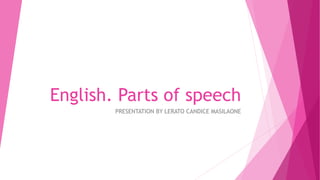
Powerpoint slideshare
- 1. English. Parts of speech PRESENTATION BY LERATO CANDICE MASILAONE
- 3. ADJECTIVES Adjectives qualify or describe Nouns and Pronouns. They add interest and colour to sentences by describing or giving more information.
- 4. Explanation of Adjectives. The adjective may come before noun: The adjective (clever, diligent) boy won the prize. The adjective may follow a linking verb (is, am, was, were): The girl is adjective (clever, diligent) We may form adjectives from nouns: Jane is an athlete (noun). He is an athletic (adjective) boy. She won the competition for her beauty (abstract noun). The beautiful (adjective) girl won the competition. Paris has an interesting history (noun). It is an historical(adjective) place.
- 5. ADJECTIVES AND ADVERBS He’s a careful driver. He drives carefully. He’s a quick worker. He works quickly. Adjective + ‘ly’
- 7. GRAMMER
- 8. She walks.
- 9. VERBS A verb is a ‘doing’ or an ‘action’ word. Focus will be on tenses. The three tenses: Present, Past and Future The tenses tells when the action takes places PRESENT (TODAY) verb I paint a picture. PAST (Yesterday) verb + ed I painted a picture. FUTURE (Tomorrow) Will/shall + verb I shall paint a picture.
- 10. The meaning of each tense is subtly different: I shall go to Cape Town tomorrow. (Future simple tense) I will be going to Cape Town tomorrow. (Future continuous tense) I shall have gone to Cape Town tomorrow. (Future perfect tense)
- 11. SINGULAR I WALK You walk She walks He walks It walks WE WALK You walk They walk 1st PERSON 2nd PERSON 3rd PERSON
- 12. Simple present tense sentences. (a) I eat lunch every afternoon. (b) Max drives to work every day. (c) We get up every morning. (d) Kyle calls Mimi every weekend. Monday Tuesday Wednesday Thursday Friday Saturday SundayHABITS = USUAL ACTIVITIESM T W Th F Sat S 1 2 3 4 5 6 7 8 9 10 11 12 13 14 15 16 17 18 19 20 21 22 23 24 25 26 27 28 29 30 31
- 13. PRACTICE OF TENSES We _____ television every day.watch watch watches
- 14. PRACTICE My friend ____ her horse every day.rides ride rides
- 15. References aAzar,B.S & Hagen,S.A. (2007). Basic English grammar. Pearson Longman. Lutrin,B & Pincus, M.(2004). English handbook and study guide. A comprehensive English Reference book. South Africa: Birnam Park.
